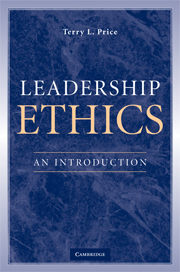Book contents
- Frontmatter
- Contents
- Acknowledgments
- Introduction
- PART I LEADER-CENTRIC APPROACHES
- PART II GROUP-CENTRIC APPROACHES
- 5 Permission and Consent
- 6 Situations and Circumstances
- 7 Membership and Moral Particularity
- 8 The Greater Good
- 9 Everyday Leadership Ethics
- Select Bibliography for Students
- Works Cited
- Index
- References
7 - Membership and Moral Particularity
Published online by Cambridge University Press: 05 June 2012
- Frontmatter
- Contents
- Acknowledgments
- Introduction
- PART I LEADER-CENTRIC APPROACHES
- PART II GROUP-CENTRIC APPROACHES
- 5 Permission and Consent
- 6 Situations and Circumstances
- 7 Membership and Moral Particularity
- 8 The Greater Good
- 9 Everyday Leadership Ethics
- Select Bibliography for Students
- Works Cited
- Index
- References
Summary
COMMUNITARIANISM
Standard moral theories aim to eradicate, or at least limit, partiality in moral decision making. For instance, Kant's deontological ethics requires that we act on demands of reason that apply equally to all rational agents, not simply on more particular reasons that can be applied only to us. It does not matter whether these particular reasons advance self-interest or group interest. In this way, Kantian ethics strictly limits the extent to which people can put themselves or their groups ahead of others.
In Chapter 8, we will see that consequentialist theories such as utilitarianism are also committed to impartiality, as evidenced – for example – by the utilitarian requirement that we count the utility, or happiness, of all agents equally. According to this view, the fact that one course of action would contribute to my own utility, or to that of members of my group, is morally irrelevant, except insofar as these contributions promote what the utilitarian ultimately seeks to maximize – namely, overall utility.
Both Kantianism and utilitarianism rest on a fundamental assumption about moral agency – that agents can be addressed independently of their circumstances, relationships, and allegiances. A commitment to this assumption implies that leaders cannot use the special importance of their groups' ends to justify rule-breaking behavior. No rational agents can endorse as generally true, in any objective sense, the idea that their group's ends are more important than the ends of all (or even most) other groups.
- Type
- Chapter
- Information
- Leadership EthicsAn Introduction, pp. 165 - 190Publisher: Cambridge University PressPrint publication year: 2008



